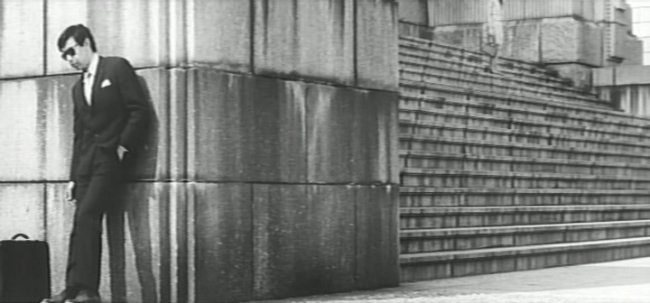
If there's a Hell for film noir characters, and it's not their own tortured lives, it might look like 1967's Branded to Kill (殺しの烙印). A satire more cruel than funny, a sincere Post Modern action film, director Seijin Suzuki riffed from a run of the mill yakuza movie script to create a commentary on film noir character tropes. The comments take the form of stripping from the world the characters inhabit any semblance of reason or dignity. It's a clever, nicely shot absurdist nightmare.

The story follows Goro Hanada (Joe Shishido), a yakuza hitman, ranked the third best marksman the criminal underworld. Most of the time he's cool and reserved, except the nostalgic smell of boiling rice seems to make him almost orgasmically excited.

His wife, Mami (Mariko Ogawa), is almost always naked and is almost always trying to get the generally distracted Goro to have sex with her. His attentions, though, are diverted by the cold and untouchable Misako Nakajo (Annu Mari) who hires him to kill someone involved in an overseas diamond smuggling operation.

He meets her in the rain and most shots of her afterwards include raindrops or something that looks like raindrops which she doesn't seem to notice. She collects dead birds and butterflies which seem to symbolise Goro trapped in his obsession with her. "I love you," she says at one point, looking at some dead birds in a cage, to which he angrily responds, "Don't despise me!" A subversion of the frequently portrayed barrier between a male protagonist and a femme fatale where there's a simultaneous sense of rejection and attraction.
The triangle here loosely resembles many seen in great films noir, from Vertigo to Out of the Past--the man, the femme fatale, and the available girl he's less interested in. Only here, everyone's motives are ultimately portrayed as cheap or childish beneath the stylistic veneer.

The movie also mocks the portrayal of alcoholism in films noir--at the beginning of the film, Goro cautions a young yakuza against drinking whisky before a job. One drink, and the young man turns into a cartoonish, stumbling drunkard who dies in a blaze of glory. Throughout the film afterwards, one drink turns even the sharpest character into a gibbering buffoon.

The end of the film mocks the intimacy that arises between two absurdly skilled adversary killers who find themselves in a stalemate. One might almost think it's a parody of the extended standoff in John Woo's The Killer if Branded to Kill weren't a much older film. The mysterious "Number 1 Hitman" (Koji Nanbara) and Goro end up in such an extended standoff, each with a gun pointed at the other, that they call a truce for periods of sleep where they get into bed together handcuffed to the frame.

The film's finale, in a decadent and grim satire of supreme skill in committing violence, drains every last bit of mystique from the trope, even taking the strangely beautiful relationship between Misako and Goro built throughout the film and reducing it to something small, sad, and silly. Though, in making it to be silly in the end, it somehow makes the rest of their relationship more beautiful.
The film has a lot in common with Godard's Pierrot le Fou, which also subverted conventions of action and suspense films by highlighting their artificiality. But there was nonetheless a sense that Godard had an affection for the characters. I think there's empathy for Suzuki's characters in Branded to Kill but I feel like this made him want to pull their wings off even more.

No comments:
Post a Comment